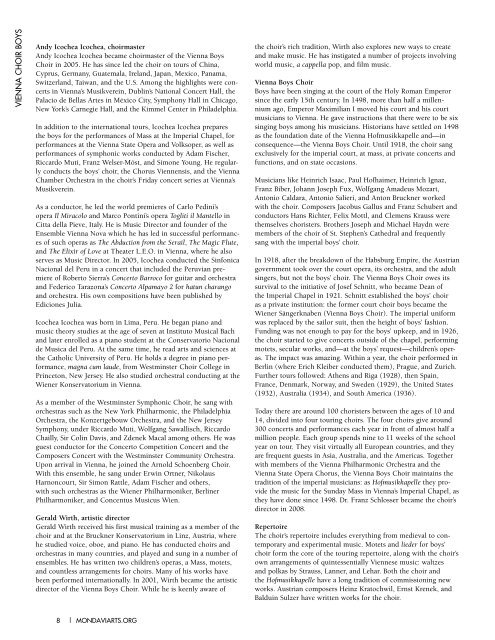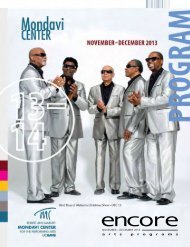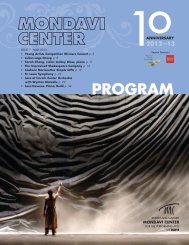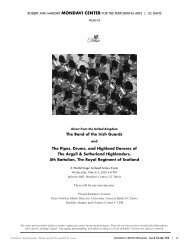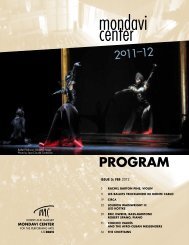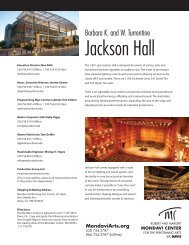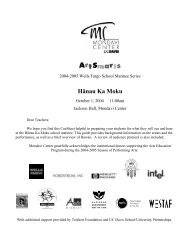Vienna Boys Choir - Mondavi Center
Vienna Boys Choir - Mondavi Center
Vienna Boys Choir - Mondavi Center
You also want an ePaper? Increase the reach of your titles
YUMPU automatically turns print PDFs into web optimized ePapers that Google loves.
<strong>Vienna</strong> <strong>Choir</strong> <strong>Boys</strong><br />
Andy Icochea Icochea, choirmaster<br />
Andy Icochea Icochea became choirmaster of the <strong>Vienna</strong> <strong>Boys</strong><br />
<strong>Choir</strong> in 2005. He has since led the choir on tours of China,<br />
Cyprus, Germany, Guatemala, Ireland, Japan, Mexico, Panama,<br />
Switzerland, Taiwan, and the U.S. Among the highlights were concerts<br />
in <strong>Vienna</strong>’s Musikverein, Dublin’s National Concert Hall, the<br />
Palacio de Bellas Artes in México City, Symphony Hall in Chicago,<br />
New York’s Carnegie Hall, and the Kimmel <strong>Center</strong> in Philadelphia.<br />
In addition to the international tours, Icochea Icochea prepares<br />
the boys for the performances of Mass at the Imperial Chapel, for<br />
performances at the <strong>Vienna</strong> State Opera and Volksoper, as well as<br />
performances of symphonic works conducted by Adam Fischer,<br />
Riccardo Muti, Franz Welser-Möst, and Simone Young. He regularly<br />
conducts the boys’ choir, the Chorus Viennensis, and the <strong>Vienna</strong><br />
Chamber Orchestra in the choir’s Friday concert series at <strong>Vienna</strong>’s<br />
Musikverein.<br />
As a conductor, he led the world premieres of Carlo Pedini’s<br />
opera Il Miracolo and Marco Pontini’s opera Togliti il Mantello in<br />
Citta della Pieve, Italy. He is Music Director and founder of the<br />
Ensemble <strong>Vienna</strong> Nova which he has led in successful performances<br />
of such operas as The Abduction from the Serail, The Magic Flute,<br />
and The Elixir of Love at Theater L.E.O. in <strong>Vienna</strong>, where he also<br />
serves as Music Director. In 2005, Icochea conducted the Sinfonica<br />
Nacional del Peru in a concert that included the Peruvian premiere<br />
of Roberto Sierra’s Concerto Barroco for guitar and orchestra<br />
and Federico Tarazona’s Concerto Alpamayo 2 for hatun charango<br />
and orchestra. His own compositions have been published by<br />
Ediciones Julia.<br />
Icochea Icochea was born in Lima, Peru. He began piano and<br />
music theory studies at the age of seven at Instituto Musical Bach<br />
and later enrolled as a piano student at the Conservatorio Nacional<br />
de Musica del Peru. At the same time, he read arts and sciences at<br />
the Catholic University of Peru. He holds a degree in piano performance,<br />
magna cum laude, from Westminster <strong>Choir</strong> College in<br />
Princeton, New Jersey. He also studied orchestral conducting at the<br />
Wiener Konservatorium in <strong>Vienna</strong>.<br />
As a member of the Westminster Symphonic <strong>Choir</strong>, he sang with<br />
orchestras such as the New York Philharmonic, the Philadelphia<br />
Orchestra, the Konzertgebouw Orchestra, and the New Jersey<br />
Symphony, under Riccardo Muti, Wolfgang Sawallisch, Riccardo<br />
Chailly, Sir Colin Davis, and Zdenek Macal among others. He was<br />
guest conductor for the Concerto Competition Concert and the<br />
Composers Concert with the Westminster Community Orchestra.<br />
Upon arrival in <strong>Vienna</strong>, he joined the Arnold Schoenberg <strong>Choir</strong>.<br />
With this ensemble, he sang under Erwin Ortner, Nikolaus<br />
Harnoncourt, Sir Simon Rattle, Adam Fischer and others,<br />
with such orchestras as the Wiener Philharmoniker, Berliner<br />
Philharmoniker, and Concentus Musicus Wien.<br />
Gerald Wirth, artistic director<br />
Gerald Wirth received his first musical training as a member of the<br />
choir and at the Bruckner Konservatorium in Linz, Austria, where<br />
he studied voice, oboe, and piano. He has conducted choirs and<br />
orchestras in many countries, and played and sung in a number of<br />
ensembles. He has written two children’s operas, a Mass, motets,<br />
and countless arrangements for choirs. Many of his works have<br />
been performed internationally. In 2001, Wirth became the artistic<br />
director of the <strong>Vienna</strong> <strong>Boys</strong> <strong>Choir</strong>. While he is keenly aware of<br />
the choir’s rich tradition, Wirth also explores new ways to create<br />
and make music. He has instigated a number of projects involving<br />
world music, a cappella pop, and film music.<br />
<strong>Vienna</strong> <strong>Boys</strong> <strong>Choir</strong><br />
<strong>Boys</strong> have been singing at the court of the Holy Roman Emperor<br />
since the early 15th century. In 1498, more than half a millennium<br />
ago, Emperor Maximilian I moved his court and his court<br />
musicians to <strong>Vienna</strong>. He gave instructions that there were to be six<br />
singing boys among his musicians. Historians have settled on 1498<br />
as the foundation date of the <strong>Vienna</strong> Hofmusikkapelle and—in<br />
consequence—the <strong>Vienna</strong> <strong>Boys</strong> <strong>Choir</strong>. Until 1918, the choir sang<br />
exclusively for the imperial court, at mass, at private concerts and<br />
functions, and on state occasions.<br />
Musicians like Heinrich Isaac, Paul Hofhaimer, Heinrich Ignaz,<br />
Franz Biber, Johann Joseph Fux, Wolfgang Amadeus Mozart,<br />
Antonio Caldara, Antonio Salieri, and Anton Bruckner worked<br />
with the choir. Composers Jacobus Gallus and Franz Schubert and<br />
conductors Hans Richter, Felix Mottl, and Clemens Krauss were<br />
themselves choristers. Brothers Joseph and Michael Haydn were<br />
members of the choir of St. Stephen’s Cathedral and frequently<br />
sang with the imperial boys’ choir.<br />
In 1918, after the breakdown of the Habsburg Empire, the Austrian<br />
government took over the court opera, its orchestra, and the adult<br />
singers, but not the boys’ choir. The <strong>Vienna</strong> <strong>Boys</strong> <strong>Choir</strong> owes its<br />
survival to the initiative of Josef Schnitt, who became Dean of<br />
the Imperial Chapel in 1921. Schnitt established the boys’ choir<br />
as a private institution: the former court choir boys became the<br />
Wiener Sängerknaben (<strong>Vienna</strong> <strong>Boys</strong> <strong>Choir</strong>). The imperial uniform<br />
was replaced by the sailor suit, then the height of boys’ fashion.<br />
Funding was not enough to pay for the boys’ upkeep, and in 1926,<br />
the choir started to give concerts outside of the chapel, performing<br />
motets, secular works, and—at the boys’ request—children’s operas.<br />
The impact was amazing. Within a year, the choir performed in<br />
Berlin (where Erich Kleiber conducted them), Prague, and Zurich.<br />
Further tours followed: Athens and Riga (1928), then Spain,<br />
France, Denmark, Norway, and Sweden (1929), the United States<br />
(1932), Australia (1934), and South America (1936).<br />
Today there are around 100 choristers between the ages of 10 and<br />
14, divided into four touring choirs. The four choirs give around<br />
300 concerts and performances each year in front of almost half a<br />
million people. Each group spends nine to 11 weeks of the school<br />
year on tour. They visit virtually all European countries, and they<br />
are frequent guests in Asia, Australia, and the Americas. Together<br />
with members of the <strong>Vienna</strong> Philharmonic Orchestra and the<br />
<strong>Vienna</strong> State Opera Chorus, the <strong>Vienna</strong> <strong>Boys</strong> <strong>Choir</strong> maintains the<br />
tradition of the imperial musicians: as Hofmusikkapelle they provide<br />
the music for the Sunday Mass in <strong>Vienna</strong>’s Imperial Chapel, as<br />
they have done since 1498. Dr. Franz Schlosser became the choir’s<br />
director in 2008.<br />
Repertoire<br />
The choir’s repertoire includes everything from medieval to contemporary<br />
and experimental music. Motets and lieder for boys’<br />
choir form the core of the touring repertoire, along with the choir’s<br />
own arrangements of quintessentially Viennese music: waltzes<br />
and polkas by Strauss, Lanner, and Lehar. Both the choir and<br />
the Hofmusikkapelle have a long tradition of commissioning new<br />
works. Austrian composers Heinz Kratochwil, Ernst Krenek, and<br />
Balduin Sulzer have written works for the choir.<br />
8 | mondaviarts.org


